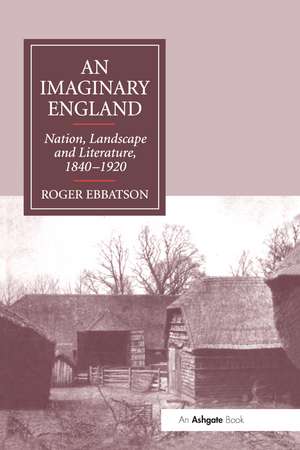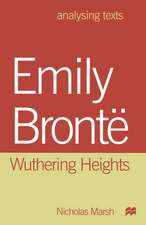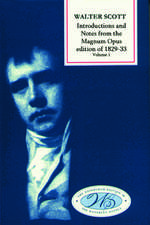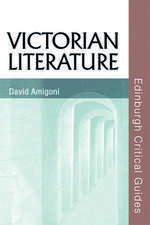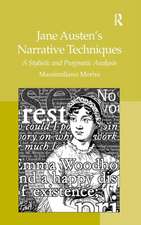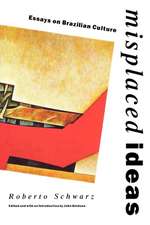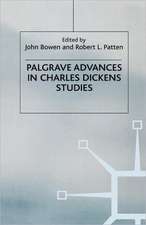An Imaginary England: Nation, Landscape and Literature, 1840–1920
Autor Roger Ebbatsonen Limba Engleză Hardback – 28 iul 2005
Preț: 764.20 lei
Preț vechi: 1027.40 lei
-26% Nou
Puncte Express: 1146
Preț estimativ în valută:
146.25€ • 152.36$ • 121.60£
146.25€ • 152.36$ • 121.60£
Carte tipărită la comandă
Livrare economică 10-24 februarie 25
Preluare comenzi: 021 569.72.76
Specificații
ISBN-13: 9780754650928
ISBN-10: 0754650928
Pagini: 240
Dimensiuni: 153 x 219 x 20 mm
Greutate: 0.45 kg
Ediția:1
Editura: Taylor & Francis
Colecția Routledge
Locul publicării:Oxford, United Kingdom
ISBN-10: 0754650928
Pagini: 240
Dimensiuni: 153 x 219 x 20 mm
Greutate: 0.45 kg
Ediția:1
Editura: Taylor & Francis
Colecția Routledge
Locul publicării:Oxford, United Kingdom
Cuprins
Contents: Preface; Introduction; Tennyson's English idylls: history, narrative, art; Enoch Arden's other island; The lonely garden: the sonnets of Charles Tennyson Turner; The Dewy Morn: Jefferies, being and history; The authorial double: Hardy and Florence Henniker; 'Trooped apparitions': Hardy and the Boer War; Poison Island: Quiller-Couch's English treasure; Rupert Brooke: the South Seas, Englishness and modernity; The imaginary England of Edward Thomas; 'England, My England': Lawrence, war and nation; Afterword; Notes; Select bibliography; Index.
Notă biografică
Roger Ebbatson is Visiting Professor at Loughborough University, having previously taught at University College Worcester and the University of Sokoto, Nigeria. He is the author of Lawrence and the Nature Tradition (1980), The Evolutionary Self (1982) and Hardy: Margin of the Unexpressed (1992).
Recenzii
'... a fascinating work which explores the links and ramifications connecting these cultural entities, and which illustrates the way that our concept of 'Englishness' has varied according to prevailing attitudes and social conditions... an incredibly rich and widely referenced backdrop of poets, novelists, artists, critics, scholars, philosophers and commentators... The study is as provocative in analysis as it is panoramic in scope. Dr Johnson once said of the Metaphysical poets that they took delight in the yoking together of disparate elements. something of this process goes on in the current work - with, I would contend, the same startling and stimulating effect... Challenging/instructive insights in which the book abounds... a fund of interest and stimulus.' Friends of the Dymock Poets Newsletter '... Ebbatson's work straddles the divide between cultural history and literary analysis, bringing to bear on his chosen texts an astonishing range of critical and contextual material.' Thomas Hardy Journal 'This is an impressive book [...] dealing with themes that we all know and wonder about: the evolving concepts of Englishness... Much of it was new to this reviewer: Charles Tennyson Turner came as a complete revelation... It is legible and pleasant to handle... Its author is widely read in modern texts and quotes copiously... it is new and stimulating, positively dancing with ideas.' The Richard Jefferies Society Journal '... rich and often brilliant study... critically informed and wide-ranging... punctilious about going back to manuscript sources, finding there some fascinating variants... One of the book's strengths is this combination of impressively wide theoretical knowledge with textual precision...' Tennyson Research Bulletin ’... well-informed and densely argued study... Wide-ranging in its erudition, An Imaginary England is firmly grounded in English domestic and imperial history, closely attentive to the formal and rhetorical properties
Descriere
In his highly theorised and original book, Roger Ebbatson traces the emergence of conceptions of England and Englishness from 1840 to 1920. His study concentrates on poetry and fiction by authors such as Alfred Lord Tennyson, Richard Jefferies, Thomas Hardy, Q, Rupert Brooke and D.H. Lawrence, reading them as a body of work through which a series of problematic English identities are imaginatively constructed. Of particular concern is the way literary landscapes serve as signs not only of identity but also of difference. Ebbatson demonstrates how a sense of cultural rootedness is contested during the period by the experiences of those on the societal margins, whether sexual, national, social or racial, resulting in a feeling of homelessness even in the most self-consciously 'English' texts. In the face of gradual imperial and industrial decline, Ebbatson argues, foreign and colonial cultures played a crucial role in transforming Englishness from a stable body of values and experiences into a much more ambiguous concept in continuous conflict with factors on the geographical or psychological 'periphery'.
